2023年冀教版中考英语一轮复习 第一课时 七年级上册(Unit 1~Unit 4)课件(共53张PPT)
文档属性
| 名称 | 2023年冀教版中考英语一轮复习 第一课时 七年级上册(Unit 1~Unit 4)课件(共53张PPT) | 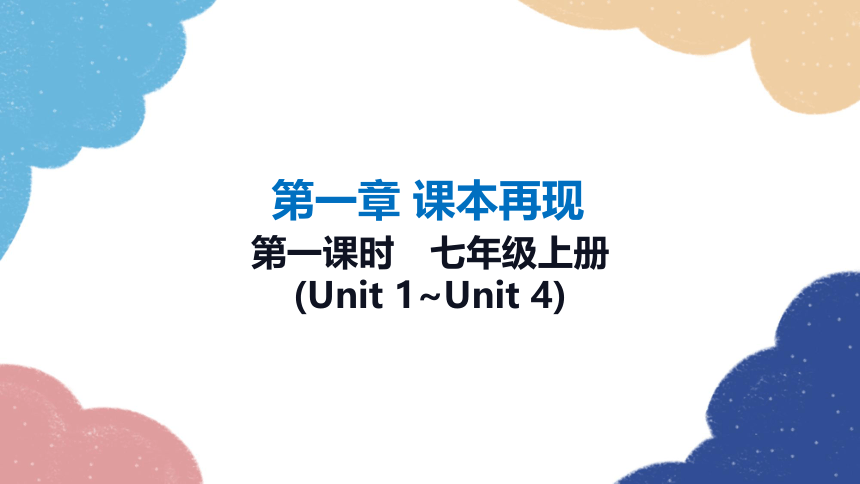 | |
| 格式 | pptx | ||
| 文件大小 | 505.6KB | ||
| 资源类型 | 教案 | ||
| 版本资源 | 冀教版 | ||
| 科目 | 英语 | ||
| 更新时间 | 2023-05-23 19:33:28 | ||
图片预览



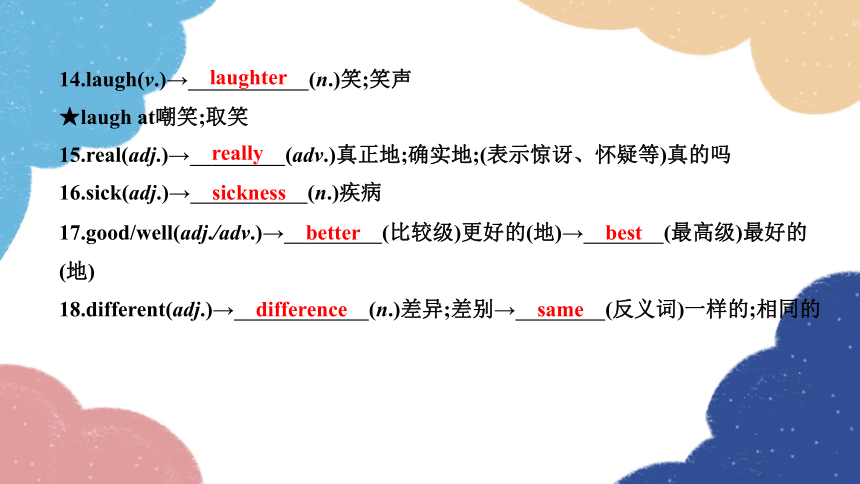

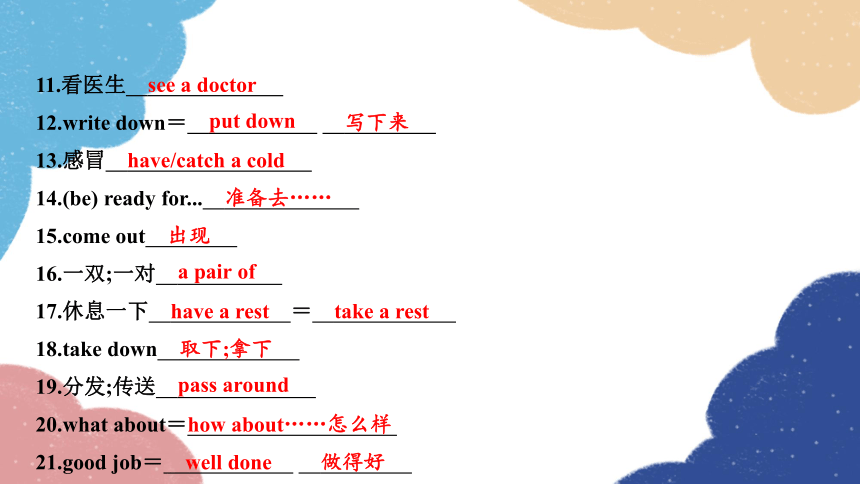
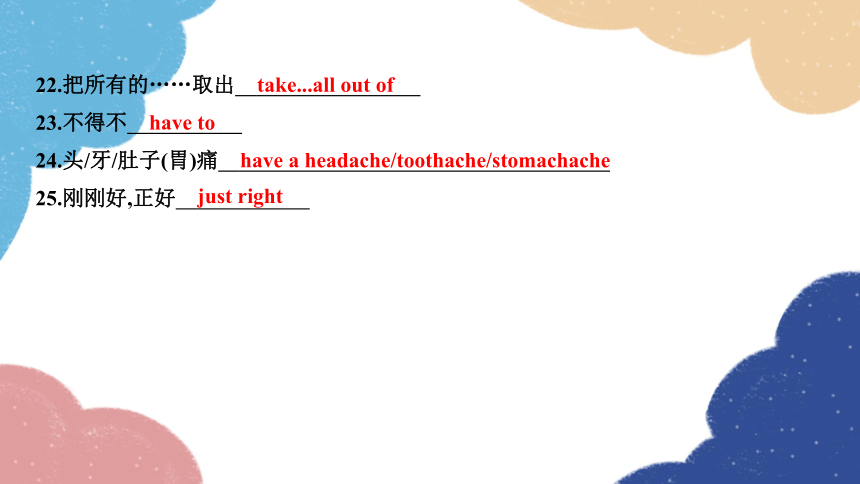
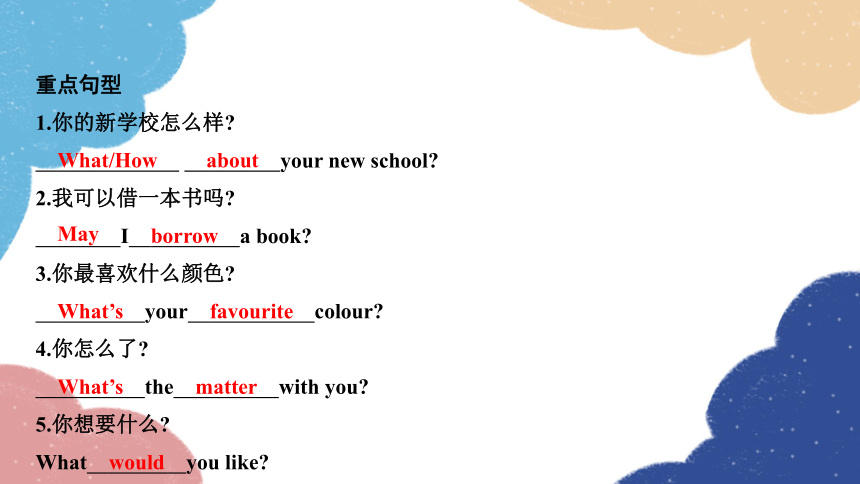

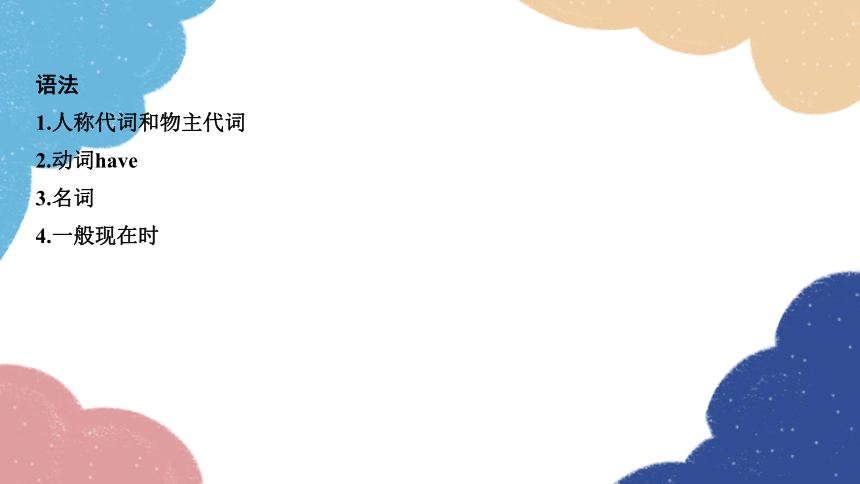

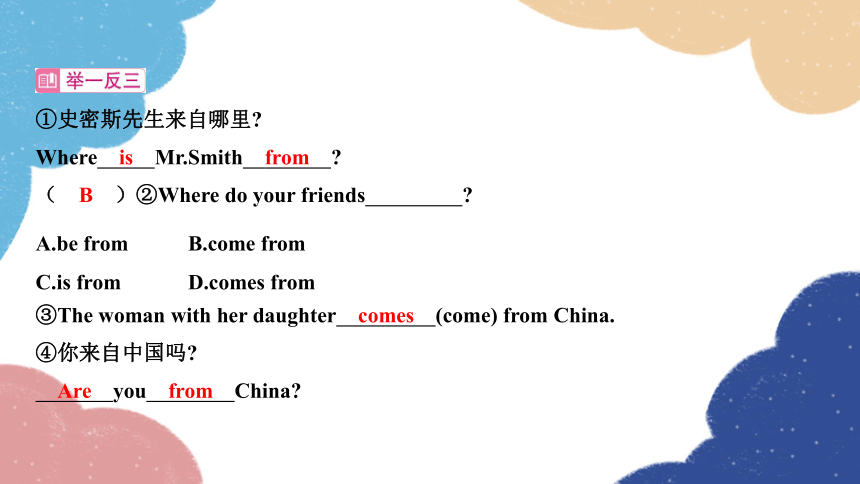
文档简介
(共53张PPT)
第一课时 七年级上册(Unit 1~Unit 4)
第一章 课本再现
知识归纳
词汇拓展
1.Canada→ Canadian (n.&adj.)加拿大人;加拿大(人)的
2.office(n.)→ officer (n.)政府官员→ official (adj.)官方的;正式的
3.fun(n.)→ funny (adj.)有趣的;可笑的
★have fun (in) doing...做……有乐趣
4.scarf(n.)→ scarfs/scarves (pl.)围巾;头巾
5.tradition(n.)→ traditional (adj.)传统的;惯例的
6.India→ Indian (n.&adj.)印度人;印度(人)的
7.centre(n.)→ central (adj.)中部的;中间的
Canadian
officer
official
funny
scarfs/scarves
traditional
Indian
central
8.medicine(n.)→ medical (adj.)医学的;医疗的
★take medicine服药
9.colour(n.)→ colourful (adj.)丰富多彩的
medical
colourful
10.paint(v.&n.)→ painting (n.)绘画;绘画作品→ painter (n.)画家
11.play(v.)→ player (n.)运动员;比赛者;选手
12.mean(v.)→ meaning (n.)意思;意义→ meaningful (adj.)有意义的→ meaningless (反义词)无意义的
13.sing(v.)→ sang (过去式)唱歌→ sung (过去分词)→ singer (n.)歌手
painting
painter
player
meaning
meaningful
meaningless
sang
sung
singer
14.laugh(v.)→ laughter (n.)笑;笑声
★laugh at嘲笑;取笑
15.real(adj.)→ really (adv.)真正地;确实地;(表示惊讶、怀疑等)真的吗
16.sick(adj.)→ sickness (n.)疾病
laughter
really
sickness
17.good/well(adj./adv.)→ better (比较级)更好的(地)→ best (最高级)最好的(地)
18.different(adj.)→ difference (n.)差异;差别→ same (反义词)一样的;相同的
better
best
difference
same
重点短语
1.be from...= come from... 来自……
2.show...around 带领……参观
3.have fun 玩得愉快
4.put on 穿上
5.和……很相配;协调 go well with
6.play with 和……一起玩
7.a bottle of... 一瓶……
8.see red 火冒三丈
9.be full of= be filled with 充满……
10.get enough rest 得到充足的休息
come from...
来自……
带领……参观
玩得愉快
穿上
go well with
和……一起玩
一瓶……
火冒三丈
be filled with
充满……
得到充足的休息
11.看医生 see a doctor
12.write down= put down 写下来
13.感冒 have/catch a cold
14.(be) ready for... 准备去……
e out 出现
16.一双;一对 a pair of
17.休息一下 have a rest = take a rest
18.take down 取下;拿下
19.分发;传送 pass around
20.what about=how about……怎么样
21.good job= well done 做得好
see a doctor
put down
写下来
have/catch a cold
准备去……
出现
a pair of
have a rest
take a rest
取下;拿下
pass around
how about……怎么样
well done
做得好
22.把所有的……取出 take...all out of
23.不得不 have to
24.头/牙/肚子(胃)痛 have a headache/toothache/stomachache
25.刚刚好,正好 just right
take...all out of
have to
have a headache/toothache/stomachache
just right
重点句型
1.你的新学校怎么样
What/How about your new school
2.我可以借一本书吗
May I borrow a book
3.你最喜欢什么颜色
What’s your favourite colour
4.你怎么了
What’s the matter with you
5.你想要什么
What would you like
What/How
about
May
borrow
What’s
favourite
What’s
matter
would
6.这本书多少钱
How much for/is the book
7.这是Bob。他1.85米高。
This is Bob.He is 1.85 metres tall .
How
much
metres
tall
8.你想和我一起去吗
Do you want to come with me
9.他长什么样
What does he look like
10.你能看到多少种颜色
How many colours do you see
to
come
What
look
like
How
many
语法
1.人称代词和物主代词
2.动词have
3.名词
4.一般现在时
考点聚焦
1.be from...
be from...意为“来自……”,与comefrom...同义。
eg:He is from Beijing.=He comes from
Beijing.
他来自北京。
①史密斯先生来自哪里
Where is Mr.Smith from
( B )②Where do your friends
A.be from B.come from
C.is from D.comes from
③The woman with her daughter comes (come) from China.
④你来自中国吗
Are you from China
is
from
B
comes
Are
from
2.with作介词
(1)意为“用……”,指“用某种工具/手段”。
eg:In China,we usually eat with chopsticks.
在中国,我们通常用筷子吃饭。
(2)意为“和……一起”,当与主语连在一起作状语时,要注意谓语的形式要与with前的主语一致,这是中考常考的知识点。
eg:My mother with me often goes shopping.
我和妈妈经常一起去购物。
(3)常见短语:with one’s help=with the
help of sb.,意为“在某人的帮助下”。
eg:I finished the important work in less
than 30 minutes with your help.
在你的帮助下,我用了不到30分钟就完成了这项重要的工作。
( B )①We see our eyes.
A.in B.with
C.of D.on
( C )②Tom his father goes hiking on
weekends.
A.and B.together
C.with D.both
B
C
( A )③It is going to rain.Take an umbrella you.
A.with B.at C.in D.from
④请用刀子割开这个包吧。
Please cut this bag with the knife.
A
with
3.borrow
borrow是动词,意为“借来;借入”,其对应词为lend,意为“借出”。
eg:—May I borrow your bike
我可以借你的自行车吗
—OK.Here you are.可以。给你。
borrow为短暂性动词。当在how long和“for+时间段”所在的句子中表示“借入”时,要把borrow变为keep。
borrow与lend
单词 用法
borrow 意为“借入”,是短暂性动词,常用结构为borrow sth.from sb.,意为“向某人借某物”。
lend 意为“借出”,常用结构为lend sth.to sb.,意为“把某物借给某人”。
eg:She borrowed a bike from her classmate.
她向同班同学借了一辆自行车。
I can lend the book to my sister.
我可以把这本书借给我妹妹。
( B )①I my dictionary to one of my
classmates,but she forgot to return it to me.
A.borrowed B.lent
C.had D.kept
( C )②—How long may I these books
—For a week.
A.borrow B.to borrow
C.keep D.lend
B
C
4.wear
wear为动词,意为“穿;戴”,其后接衣服、鞋、帽子、眼镜等名词。
wear,in与put on
词汇 含义 用法
wear 穿;戴 表示状态
in 穿着;戴着 表示状态
put on 穿上;戴上 表示动作
①The little girl is in a red sweater.(改为同义句)
The little girl is wearing a red sweater.
( C )②The students their jackets and went out.
A.wears B.wore
C.put on D.puts on
is
wearing
C
5.be ready for
be ready for意为“准备去……”,后接动词-ing形式或名词,be动词随主语的变化而变化。
eg:The students are ready for class.
学生们准备去上课了。
be ready for sth.与be ready to do
sth.
be ready for sth. 准备去 做某事 I am ready for supper now.
现在我准备去吃晚餐了。
be ready to do sth. 准备好 做某事 I am ready to have supper.
我准备好吃晚餐了。
be ready意为“准备好的”。
eg:Supper is ready.晚餐准备好了。
( C )①The students have to class
when the teacher comes in.
A.are ready for B.are ready to
C.be ready for D.be ready to
( A )②Her father bought her a new coat and a
pair of gloves.Now she the
winter.
A.is ready for B.is ready to
C.was ready for D.was ready to
C
A
6.a pair of...
a pair of...意为“一双/对/副……”,后必须接复数名词。当a pair of...作主语时,句子的谓语动词要用单数形式;如果是two/three/.../some pairs of...作主语,句子的谓语动词要用复数形式,即句子的谓语动词要与pair 的数保持一致。
eg:There is a pair of shoes under the bed.
床下有一双鞋。
表示“一双/条新……”时,pair在与trousers(裤子),scissors(剪刀)等两部分不能分离的词连用时,可以说a new pair of trousers/scissors;但在与shoes,gloves等两部分可以分离的单词连用时,要说a pair of new shoes/gloves。
①桌子上有两副手套。
There are two pairs of gloves on the table.
( A )②There a pair of gloves and two
boxes on the table.
A.is B.are C.were D.be
two pairs of
A
7.enough
(1)enough作形容词,意为“足够的”,作定语修饰名词,位于名词之前或之后。
eg:I don’t have enough money to buy this
computer.我没有足够的钱买这台电脑。
(2)enough 作副词,意为“足够地”,用在形容词或副词之后。常构成“形容词/副词+enough”结构,意为“足够……”。
eg:The little girl is old enough to go to
school.
这个小女孩足够大了,可以去上学了。
He knows the situation well enough.
他对情况了解得非常清楚。
( C )①I love Kunming because it is in
winter.
A.enough warm B.warmly enough
C.warm enough D.enough warmly
( C )②It was for us to solve the math problem.Few of us could even understand it.
A.easy enough B.enough easy
C.difficult enough D.enough difficult
C
C
8.What do you look like 你长什么样
“What do/does sb.look like ”意为“某人长什么样 ”,常用来询问某人的外表。而句型“What+be动词+sb.like ”意为“某人性格怎么样 ”,用来询问某人的性格。
eg:What does your father look like
你父亲长什么样
What is your mother like
你妈妈性格怎么样
( C )①—What does your sister
—She has black hair and two big eyes.
A.look for B.look up
C.look like D.look at
②他们的数学老师性格如何
What is their maths teacher like
C
is
like
9.What about your new school 你的新学校怎么样
“What about... ”是口语用语,用于询问情况或征求对方的意见,意为“……怎么样 ”,可与“How about... ”互换。其中about是介词,后跟名词、代词或动词-ing形式。
eg:What/How about playing football
踢足球怎么样
( C )①—What about for a walk after supper
—Sorry,I have to prepare for the maths test tomorrow.
A.to go B.go C.going D.gone
( A )②—What about flying kites this Sunday
— .I like it and I can’t wait to go with you.
A.Good idea B.Sorry
C.I don’t know D.Hold on
C
A
10.Time for breakfast!该吃早餐了!
这是一个省略句,完整的句子为“It is time for breakfast!”。“It is time for...”意为“到……的时间了”,相当于句型“It is time to do sth.”,常用于催促对方做某事或告知某人做某事的时间到了。其中for是介词,后跟名词、代词或动词-ing形式。如果涉及具体某人时要说“It is time for sb.to do sth.”。
①我们该上学了。
It’s time for us to go to
school.
( A )②—Time supper,Jenny.
—I am coming,Mum.
A.for B.to
C.for have D.to having
for
to go
A
11.How much are the noodles 面条多少钱
“How much+be动词+名词 ”用于询问价钱,be动词形式根据名词的单复数来确定。还可以直接说“How much for+名词 ”。
eg:Could you tell me how much it is
您能告诉我它多少钱吗
询问价钱还可以用句型“What’s the price of+名词 ”或“What/How much does+名词+cost ”。
eg:How much is this coat =
What is the price of this coat =
What does this coat cost =
How much does this coat cost
这件外套多少钱
①这件衬衫多少钱
How much is this shirt
②His sports shoes are 25 yuan.(改为同义句)
The price of his sports shoes is 25 yuan.
How
much
price
of
is
12.Would you like something to drink 你想要喝点什么吗
“Would you like... ”意为“你/你们想要……吗 ”,like后跟名词、代词或动词不定式。该句型与“Do you want... ”意思相同。
eg:Would you like me to meet your family =Do you want me to you’re your family
你想要我见一见你的家人吗
对“Would you like... ”提出的建议或要求,肯定回答常用“Yes,please.”或“Yes,I would love/like to.”(I would可缩写为I’d),否定回答常用“No,thanks.”或“I’d love/like to,but...”。
( B )①—Would you like a bowl of beef noodles
— .I’m full.
A.Yes,please B.No,thanks
C.Help yourself D.With pleasure
( D )②Mary’s parents would like her
a doctor when she grows up.
A.been B.being
C.be D.to be
B
D
五年中考
一、单项选择
( D )1.(2022·省卷)These are my cousins.
are both university students.
A.We B.You C.I D.They
( B )2.(2022·甘南州)Lucy’s favourite is red.
A.fruit B.colour C.juice
( C )3.(2022·甘南州)It’s raining and cold outside.You should your jacket.
A.take off B.take in C.put on
D
B
C
( C )4.(2020·省卷)—Is that your father
—No,he is my .He is my father’s twin brother.
A.brother B.grandpa
C.uncle D.cousin
( D )5.(2020·省卷)—Would you give me some juice,Linda
—
A.Yes,please. B.The same to you .
C.Never mind! D.Certainly.
C
D
( C )6.(2019·省卷)—Here is my family ________.We took it last year.
—What a happy family!
A.member B.name
C.photo D.house
( A )7.(2019·省卷)Sunny’s uncle is a teacher. enjoys staying with kids.
A.He B.She C.It D.I
( D )8.(2019·兰州)Frank is a friend of____________.He is a scientist from Canada.
A.my B.I C.me D.mine
C
A
D
( C )9.(2018·省卷)There are many good teachers in school.
A.we B.him
C.our D.themselves
C
二、用所给词的适当形式填空
1.(2022·省卷)I bought two notebooks (notebook) yesterday.
2.(2021·省卷)There are three apples (apple) on the table.
3.(2021·兰州)There will be two tigers (tiger) in the new zoo.
4.(2021·兰州)The twins were helping their (they) parents make zongzi for the Dragon Boat Festival.
5.(2021·兰州)There are a lot of trees (tree) along the road to our village.
6.(2021·兰州)Xiaoming,can you come to my (I) birthday party
7.(2020·省卷)Don’t always make decisions for your daughter.The choice is hers (her).
notebooks
apples
tigers
their
trees
my
hers
8.(2020·兰州)She does (do) sports every day and never stays up late.
9.(2019·兰州改编)Li Lei is interested in English and he watches (watch) English news every day.
10.(2018·省卷)Too much sugar is bad for your teeth (tooth).
does
watches
teeth
备考演练
一、单项选择
( B )1.(2022·四川广元)—Can you show your new book to
—OK.Here you are.
A.I B.me C.my D.mine
( A )2.(2022·广西贵港)—I have a . What should I do
—You should go to the dentist.
A.toothache B.headache
C.stomachache D.fever
B
A
( B )3.(2022·湖北武汉)—Would you like to visit the National Science Museum with me tomorrow,Amy
— .
A.See you then B.Sounds nice
C.Excuse me D.I hope not
( B )4.(2022·湖北黄冈)—Maria,don’t forget to the sports shoes.You have a P.E.class today.
—Thanks,Mum.I won’t.
A.get up B.put on
C.take off D.cut down
B
B
( B )5.(2022·江苏宿迁)Amy did very well in her report.She is to pay attention to every detail.
A.enough careful B.careful enough
C.enough careless D.careless enough
( C )6.(2022·福建)—May I your pen I can’t find mine.
—Sure.Here you are.
A.repair B.make C.borrow
( C )7.(2022·湖北天门)This isn’t my schoolbag. is over there.
A.His B.Hers C.Mine D.Yours
B
C
C
( D )8.(2022·江苏徐州)—I love this T-shirt. does it cost
—50 yuan.Why not try it on
A.How long B.How often
C.How old D.How much
( A )9.(2022·四川凉山州)—Grandpa,there are few vegetables in the fridge.
—I’ll get some after lunch.
A.carrots B.apples C.juice
D
A
二、用所给词的适当形式填空
1.(2022·江苏泰州改编)The film The Battle at Lake Changjin(《长津湖》) showed us many heroes (hero) in the War to Resist U.S.Aggression and Aid Korea(抗美援朝战争).
2.(2022·山东济宁改编)I usually borrow (borrow) some books from our school
library.
3.(2022·贵州贵阳)Reading makes us (we) wiser and more learned.
4.(2022·广西北部湾经济区)There are some cups (cup) of tea on the table.
5.(2022·江苏连云港改编)—Whose gloves (glove) are these They aren’t mine.
—They’re Lucy’s.
heroes
borrow
us
cups
gloves
三、根据汉语意思完成句子
1.(2022·湖北恩施州改编)我的笔友David来自一个欧洲国家。
My pen pal,David, comes/is from
a European country.
2.(2022·重庆)那位62岁的女士足够勇敢,从湖里救起了一位小伙子。
The 62-year-old lady was brave enough to save a young man in the lake.
3.(2022·江苏连云港改编)明天早上谁将带领你们参观新的实验室
Who will show you around the newlab tomorrow morning
4.(2021·重庆)天冷时,请穿上暖和的衣服。
Please put on warm clothes when it’s cold.
comes/is
from
enough
to
show
around
put
on
5.(2021·江苏连云港改编)在当地消防员的帮助下,我们学到了一些消防安全技能。
With the help of the local firemen,we learned some fire safety skills.
With
help
第一课时 七年级上册(Unit 1~Unit 4)
第一章 课本再现
知识归纳
词汇拓展
1.Canada→ Canadian (n.&adj.)加拿大人;加拿大(人)的
2.office(n.)→ officer (n.)政府官员→ official (adj.)官方的;正式的
3.fun(n.)→ funny (adj.)有趣的;可笑的
★have fun (in) doing...做……有乐趣
4.scarf(n.)→ scarfs/scarves (pl.)围巾;头巾
5.tradition(n.)→ traditional (adj.)传统的;惯例的
6.India→ Indian (n.&adj.)印度人;印度(人)的
7.centre(n.)→ central (adj.)中部的;中间的
Canadian
officer
official
funny
scarfs/scarves
traditional
Indian
central
8.medicine(n.)→ medical (adj.)医学的;医疗的
★take medicine服药
9.colour(n.)→ colourful (adj.)丰富多彩的
medical
colourful
10.paint(v.&n.)→ painting (n.)绘画;绘画作品→ painter (n.)画家
11.play(v.)→ player (n.)运动员;比赛者;选手
12.mean(v.)→ meaning (n.)意思;意义→ meaningful (adj.)有意义的→ meaningless (反义词)无意义的
13.sing(v.)→ sang (过去式)唱歌→ sung (过去分词)→ singer (n.)歌手
painting
painter
player
meaning
meaningful
meaningless
sang
sung
singer
14.laugh(v.)→ laughter (n.)笑;笑声
★laugh at嘲笑;取笑
15.real(adj.)→ really (adv.)真正地;确实地;(表示惊讶、怀疑等)真的吗
16.sick(adj.)→ sickness (n.)疾病
laughter
really
sickness
17.good/well(adj./adv.)→ better (比较级)更好的(地)→ best (最高级)最好的(地)
18.different(adj.)→ difference (n.)差异;差别→ same (反义词)一样的;相同的
better
best
difference
same
重点短语
1.be from...= come from... 来自……
2.show...around 带领……参观
3.have fun 玩得愉快
4.put on 穿上
5.和……很相配;协调 go well with
6.play with 和……一起玩
7.a bottle of... 一瓶……
8.see red 火冒三丈
9.be full of= be filled with 充满……
10.get enough rest 得到充足的休息
come from...
来自……
带领……参观
玩得愉快
穿上
go well with
和……一起玩
一瓶……
火冒三丈
be filled with
充满……
得到充足的休息
11.看医生 see a doctor
12.write down= put down 写下来
13.感冒 have/catch a cold
14.(be) ready for... 准备去……
e out 出现
16.一双;一对 a pair of
17.休息一下 have a rest = take a rest
18.take down 取下;拿下
19.分发;传送 pass around
20.what about=how about……怎么样
21.good job= well done 做得好
see a doctor
put down
写下来
have/catch a cold
准备去……
出现
a pair of
have a rest
take a rest
取下;拿下
pass around
how about……怎么样
well done
做得好
22.把所有的……取出 take...all out of
23.不得不 have to
24.头/牙/肚子(胃)痛 have a headache/toothache/stomachache
25.刚刚好,正好 just right
take...all out of
have to
have a headache/toothache/stomachache
just right
重点句型
1.你的新学校怎么样
What/How about your new school
2.我可以借一本书吗
May I borrow a book
3.你最喜欢什么颜色
What’s your favourite colour
4.你怎么了
What’s the matter with you
5.你想要什么
What would you like
What/How
about
May
borrow
What’s
favourite
What’s
matter
would
6.这本书多少钱
How much for/is the book
7.这是Bob。他1.85米高。
This is Bob.He is 1.85 metres tall .
How
much
metres
tall
8.你想和我一起去吗
Do you want to come with me
9.他长什么样
What does he look like
10.你能看到多少种颜色
How many colours do you see
to
come
What
look
like
How
many
语法
1.人称代词和物主代词
2.动词have
3.名词
4.一般现在时
考点聚焦
1.be from...
be from...意为“来自……”,与comefrom...同义。
eg:He is from Beijing.=He comes from
Beijing.
他来自北京。
①史密斯先生来自哪里
Where is Mr.Smith from
( B )②Where do your friends
A.be from B.come from
C.is from D.comes from
③The woman with her daughter comes (come) from China.
④你来自中国吗
Are you from China
is
from
B
comes
Are
from
2.with作介词
(1)意为“用……”,指“用某种工具/手段”。
eg:In China,we usually eat with chopsticks.
在中国,我们通常用筷子吃饭。
(2)意为“和……一起”,当与主语连在一起作状语时,要注意谓语的形式要与with前的主语一致,这是中考常考的知识点。
eg:My mother with me often goes shopping.
我和妈妈经常一起去购物。
(3)常见短语:with one’s help=with the
help of sb.,意为“在某人的帮助下”。
eg:I finished the important work in less
than 30 minutes with your help.
在你的帮助下,我用了不到30分钟就完成了这项重要的工作。
( B )①We see our eyes.
A.in B.with
C.of D.on
( C )②Tom his father goes hiking on
weekends.
A.and B.together
C.with D.both
B
C
( A )③It is going to rain.Take an umbrella you.
A.with B.at C.in D.from
④请用刀子割开这个包吧。
Please cut this bag with the knife.
A
with
3.borrow
borrow是动词,意为“借来;借入”,其对应词为lend,意为“借出”。
eg:—May I borrow your bike
我可以借你的自行车吗
—OK.Here you are.可以。给你。
borrow为短暂性动词。当在how long和“for+时间段”所在的句子中表示“借入”时,要把borrow变为keep。
borrow与lend
单词 用法
borrow 意为“借入”,是短暂性动词,常用结构为borrow sth.from sb.,意为“向某人借某物”。
lend 意为“借出”,常用结构为lend sth.to sb.,意为“把某物借给某人”。
eg:She borrowed a bike from her classmate.
她向同班同学借了一辆自行车。
I can lend the book to my sister.
我可以把这本书借给我妹妹。
( B )①I my dictionary to one of my
classmates,but she forgot to return it to me.
A.borrowed B.lent
C.had D.kept
( C )②—How long may I these books
—For a week.
A.borrow B.to borrow
C.keep D.lend
B
C
4.wear
wear为动词,意为“穿;戴”,其后接衣服、鞋、帽子、眼镜等名词。
wear,in与put on
词汇 含义 用法
wear 穿;戴 表示状态
in 穿着;戴着 表示状态
put on 穿上;戴上 表示动作
①The little girl is in a red sweater.(改为同义句)
The little girl is wearing a red sweater.
( C )②The students their jackets and went out.
A.wears B.wore
C.put on D.puts on
is
wearing
C
5.be ready for
be ready for意为“准备去……”,后接动词-ing形式或名词,be动词随主语的变化而变化。
eg:The students are ready for class.
学生们准备去上课了。
be ready for sth.与be ready to do
sth.
be ready for sth. 准备去 做某事 I am ready for supper now.
现在我准备去吃晚餐了。
be ready to do sth. 准备好 做某事 I am ready to have supper.
我准备好吃晚餐了。
be ready意为“准备好的”。
eg:Supper is ready.晚餐准备好了。
( C )①The students have to class
when the teacher comes in.
A.are ready for B.are ready to
C.be ready for D.be ready to
( A )②Her father bought her a new coat and a
pair of gloves.Now she the
winter.
A.is ready for B.is ready to
C.was ready for D.was ready to
C
A
6.a pair of...
a pair of...意为“一双/对/副……”,后必须接复数名词。当a pair of...作主语时,句子的谓语动词要用单数形式;如果是two/three/.../some pairs of...作主语,句子的谓语动词要用复数形式,即句子的谓语动词要与pair 的数保持一致。
eg:There is a pair of shoes under the bed.
床下有一双鞋。
表示“一双/条新……”时,pair在与trousers(裤子),scissors(剪刀)等两部分不能分离的词连用时,可以说a new pair of trousers/scissors;但在与shoes,gloves等两部分可以分离的单词连用时,要说a pair of new shoes/gloves。
①桌子上有两副手套。
There are two pairs of gloves on the table.
( A )②There a pair of gloves and two
boxes on the table.
A.is B.are C.were D.be
two pairs of
A
7.enough
(1)enough作形容词,意为“足够的”,作定语修饰名词,位于名词之前或之后。
eg:I don’t have enough money to buy this
computer.我没有足够的钱买这台电脑。
(2)enough 作副词,意为“足够地”,用在形容词或副词之后。常构成“形容词/副词+enough”结构,意为“足够……”。
eg:The little girl is old enough to go to
school.
这个小女孩足够大了,可以去上学了。
He knows the situation well enough.
他对情况了解得非常清楚。
( C )①I love Kunming because it is in
winter.
A.enough warm B.warmly enough
C.warm enough D.enough warmly
( C )②It was for us to solve the math problem.Few of us could even understand it.
A.easy enough B.enough easy
C.difficult enough D.enough difficult
C
C
8.What do you look like 你长什么样
“What do/does sb.look like ”意为“某人长什么样 ”,常用来询问某人的外表。而句型“What+be动词+sb.like ”意为“某人性格怎么样 ”,用来询问某人的性格。
eg:What does your father look like
你父亲长什么样
What is your mother like
你妈妈性格怎么样
( C )①—What does your sister
—She has black hair and two big eyes.
A.look for B.look up
C.look like D.look at
②他们的数学老师性格如何
What is their maths teacher like
C
is
like
9.What about your new school 你的新学校怎么样
“What about... ”是口语用语,用于询问情况或征求对方的意见,意为“……怎么样 ”,可与“How about... ”互换。其中about是介词,后跟名词、代词或动词-ing形式。
eg:What/How about playing football
踢足球怎么样
( C )①—What about for a walk after supper
—Sorry,I have to prepare for the maths test tomorrow.
A.to go B.go C.going D.gone
( A )②—What about flying kites this Sunday
— .I like it and I can’t wait to go with you.
A.Good idea B.Sorry
C.I don’t know D.Hold on
C
A
10.Time for breakfast!该吃早餐了!
这是一个省略句,完整的句子为“It is time for breakfast!”。“It is time for...”意为“到……的时间了”,相当于句型“It is time to do sth.”,常用于催促对方做某事或告知某人做某事的时间到了。其中for是介词,后跟名词、代词或动词-ing形式。如果涉及具体某人时要说“It is time for sb.to do sth.”。
①我们该上学了。
It’s time for us to go to
school.
( A )②—Time supper,Jenny.
—I am coming,Mum.
A.for B.to
C.for have D.to having
for
to go
A
11.How much are the noodles 面条多少钱
“How much+be动词+名词 ”用于询问价钱,be动词形式根据名词的单复数来确定。还可以直接说“How much for+名词 ”。
eg:Could you tell me how much it is
您能告诉我它多少钱吗
询问价钱还可以用句型“What’s the price of+名词 ”或“What/How much does+名词+cost ”。
eg:How much is this coat =
What is the price of this coat =
What does this coat cost =
How much does this coat cost
这件外套多少钱
①这件衬衫多少钱
How much is this shirt
②His sports shoes are 25 yuan.(改为同义句)
The price of his sports shoes is 25 yuan.
How
much
price
of
is
12.Would you like something to drink 你想要喝点什么吗
“Would you like... ”意为“你/你们想要……吗 ”,like后跟名词、代词或动词不定式。该句型与“Do you want... ”意思相同。
eg:Would you like me to meet your family =Do you want me to you’re your family
你想要我见一见你的家人吗
对“Would you like... ”提出的建议或要求,肯定回答常用“Yes,please.”或“Yes,I would love/like to.”(I would可缩写为I’d),否定回答常用“No,thanks.”或“I’d love/like to,but...”。
( B )①—Would you like a bowl of beef noodles
— .I’m full.
A.Yes,please B.No,thanks
C.Help yourself D.With pleasure
( D )②Mary’s parents would like her
a doctor when she grows up.
A.been B.being
C.be D.to be
B
D
五年中考
一、单项选择
( D )1.(2022·省卷)These are my cousins.
are both university students.
A.We B.You C.I D.They
( B )2.(2022·甘南州)Lucy’s favourite is red.
A.fruit B.colour C.juice
( C )3.(2022·甘南州)It’s raining and cold outside.You should your jacket.
A.take off B.take in C.put on
D
B
C
( C )4.(2020·省卷)—Is that your father
—No,he is my .He is my father’s twin brother.
A.brother B.grandpa
C.uncle D.cousin
( D )5.(2020·省卷)—Would you give me some juice,Linda
—
A.Yes,please. B.The same to you .
C.Never mind! D.Certainly.
C
D
( C )6.(2019·省卷)—Here is my family ________.We took it last year.
—What a happy family!
A.member B.name
C.photo D.house
( A )7.(2019·省卷)Sunny’s uncle is a teacher. enjoys staying with kids.
A.He B.She C.It D.I
( D )8.(2019·兰州)Frank is a friend of____________.He is a scientist from Canada.
A.my B.I C.me D.mine
C
A
D
( C )9.(2018·省卷)There are many good teachers in school.
A.we B.him
C.our D.themselves
C
二、用所给词的适当形式填空
1.(2022·省卷)I bought two notebooks (notebook) yesterday.
2.(2021·省卷)There are three apples (apple) on the table.
3.(2021·兰州)There will be two tigers (tiger) in the new zoo.
4.(2021·兰州)The twins were helping their (they) parents make zongzi for the Dragon Boat Festival.
5.(2021·兰州)There are a lot of trees (tree) along the road to our village.
6.(2021·兰州)Xiaoming,can you come to my (I) birthday party
7.(2020·省卷)Don’t always make decisions for your daughter.The choice is hers (her).
notebooks
apples
tigers
their
trees
my
hers
8.(2020·兰州)She does (do) sports every day and never stays up late.
9.(2019·兰州改编)Li Lei is interested in English and he watches (watch) English news every day.
10.(2018·省卷)Too much sugar is bad for your teeth (tooth).
does
watches
teeth
备考演练
一、单项选择
( B )1.(2022·四川广元)—Can you show your new book to
—OK.Here you are.
A.I B.me C.my D.mine
( A )2.(2022·广西贵港)—I have a . What should I do
—You should go to the dentist.
A.toothache B.headache
C.stomachache D.fever
B
A
( B )3.(2022·湖北武汉)—Would you like to visit the National Science Museum with me tomorrow,Amy
— .
A.See you then B.Sounds nice
C.Excuse me D.I hope not
( B )4.(2022·湖北黄冈)—Maria,don’t forget to the sports shoes.You have a P.E.class today.
—Thanks,Mum.I won’t.
A.get up B.put on
C.take off D.cut down
B
B
( B )5.(2022·江苏宿迁)Amy did very well in her report.She is to pay attention to every detail.
A.enough careful B.careful enough
C.enough careless D.careless enough
( C )6.(2022·福建)—May I your pen I can’t find mine.
—Sure.Here you are.
A.repair B.make C.borrow
( C )7.(2022·湖北天门)This isn’t my schoolbag. is over there.
A.His B.Hers C.Mine D.Yours
B
C
C
( D )8.(2022·江苏徐州)—I love this T-shirt. does it cost
—50 yuan.Why not try it on
A.How long B.How often
C.How old D.How much
( A )9.(2022·四川凉山州)—Grandpa,there are few vegetables in the fridge.
—I’ll get some after lunch.
A.carrots B.apples C.juice
D
A
二、用所给词的适当形式填空
1.(2022·江苏泰州改编)The film The Battle at Lake Changjin(《长津湖》) showed us many heroes (hero) in the War to Resist U.S.Aggression and Aid Korea(抗美援朝战争).
2.(2022·山东济宁改编)I usually borrow (borrow) some books from our school
library.
3.(2022·贵州贵阳)Reading makes us (we) wiser and more learned.
4.(2022·广西北部湾经济区)There are some cups (cup) of tea on the table.
5.(2022·江苏连云港改编)—Whose gloves (glove) are these They aren’t mine.
—They’re Lucy’s.
heroes
borrow
us
cups
gloves
三、根据汉语意思完成句子
1.(2022·湖北恩施州改编)我的笔友David来自一个欧洲国家。
My pen pal,David, comes/is from
a European country.
2.(2022·重庆)那位62岁的女士足够勇敢,从湖里救起了一位小伙子。
The 62-year-old lady was brave enough to save a young man in the lake.
3.(2022·江苏连云港改编)明天早上谁将带领你们参观新的实验室
Who will show you around the newlab tomorrow morning
4.(2021·重庆)天冷时,请穿上暖和的衣服。
Please put on warm clothes when it’s cold.
comes/is
from
enough
to
show
around
put
on
5.(2021·江苏连云港改编)在当地消防员的帮助下,我们学到了一些消防安全技能。
With the help of the local firemen,we learned some fire safety skills.
With
help
